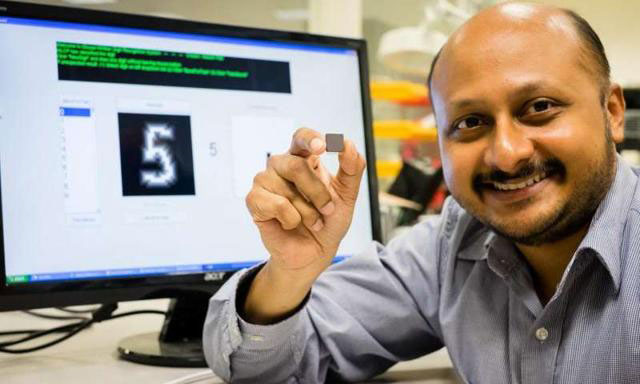Indian-origin scientist develops a smart chip that can wirelessly transmit brain signals
Scientists, including one of Indian-origin, at Nanyang Technological University, Singapore (NTU Singapore) have developed a smart chip that can be paired with neural implants for efficient wireless transmission of brain signals to inner organs that can be monitored from outside. Neural implants, when embedded in the brain, can reverse the symptoms of Parkinson’s disease or give paraplegic people the ability to move their dead or prosthetic limbs, especially the neck-down paraplegics.
However, they need to be connected by wires to an external device outside the body, say a computer that decodes the brain signals so the artificial limb can move, which are cumbersome.

Led by Indian-born scientist Arindam Basu, the team of Scientists from Nanyang Technological University, Singapore (NTU Singapore) has tested the chip on animal models and remarkable results have been obtained, including an accuracy of 95% in decoding brain’s signals to the hand and fingers.
“What we have developed is a very versatile smart chip that can process data, analyse patterns and spot the difference,” explained Assistant Professor Arindam Basu from NTU’s School of Electrical and Electronic Engineering.
“It is about a hundred times more efficient than current processing chips on the market. It will lead to more compact medical wearable devices, such as portable ECG monitoring devices and neural implants, since we no longer need large batteries to power them.”
To achieve high accuracy in decoding brain signals, implants require thousands of channels of raw data. To wirelessly transmit this large amount of data, more power is also needed which means either bigger batteries or more frequent recharging.
Designed to be extremely power-efficient, the smart chip will analyse and decode the thousands of signals from the neural implants in the brain, before compressing the results and sending it wirelessly to a small external receiver. The smart chip is designed to analyse data patterns and spot any abnormal or unusual patterns.
This would be extremely beneficial for the Internet of Things (IOT), where every electrical and electronic device is connected to the internet through a smart chip. This will reduce data usage by over a thousand times.
















































